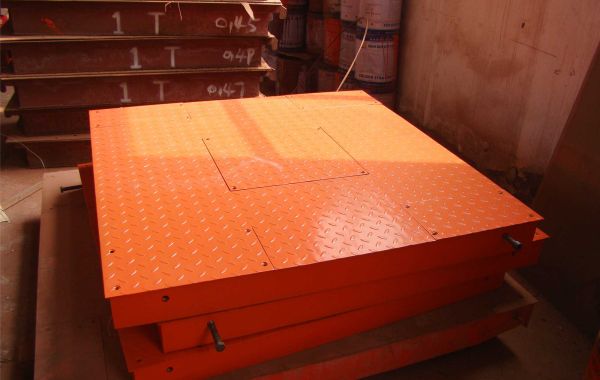Beyond the Basics: Advanced Features of Industrial Floor Scales
Today's industrial floor scales boast a range of features that enhance their functionality and versatility. Here are some of the most notable:
High Capacity and Precision: Industrial scales can handle loads from a few pounds to hundreds of tons, while maintaining exceptional accuracy. This caters to a wide range of applications, from weighing small parcels to massive machinery.
Digital Readouts and Connectivity: Gone are the days of analog dials. Digital readouts provide clear and easy-to-read weight data. Many scales offer connectivity options like Bluetooth or Wi-Fi, allowing data to be transmitted to computers, tablets, or cloud-based platforms for further analysis and record keeping.
Tare Weighing: This crucial feature allows you to "zero out" the weight of the container or pallet, so you only measure the weight of the contents. This is essential for accurate weighing of materials in boxes, drums, or on pallets.
Counting Mode: Counting mode simplifies the process of counting large quantities of identical items. The scale determines the weight of a single item, and then calculates the total quantity based on the combined weight.
Check Weighing: This feature helps ensure consistent weight within pre-defined limits. Indicators like lights or alarms can signal if an item is underweight, overweight, or within the acceptable range.
Data Printing and Integration: Many scales offer the ability to print weight tickets directly, complete with timestamps and other relevant data. Integration with inventory management software allows for seamless data transfer and record keeping.
Applications: Where Industrial Floor Scales Shine
The applications for industrial floor scales are vast and diverse. Here are just a few examples:
Manufacturing: Monitoring raw material usage, ensuring product weight accuracy, and tracking production output.
Warehousing: Receiving and shipping inventory, managing stock levels, and optimizing warehouse space utilization.
Logistics and Transportation: Weighing cargo for shipping compliance, calculating freight costs, and preventing overloading.
Waste Management: Weighing waste for billing purposes, monitoring recycling efforts, and ensuring compliance with waste disposal regulations.
Agriculture: Weighing crops, livestock, and fertilizers to optimize yield and manage resources effectively.
Chemical and Pharmaceutical Industries: Ensuring accurate dispensing and mixing of ingredients for process control and quality assurance.
Choosing the Right Industrial Floor Scale for Your Needs
With such a variety of features and applications, selecting the right industrial floor scale requires careful consideration. Here are some factors to keep in mind:
Weight Capacity: Choose a scale with a capacity that exceeds your heaviest loads.
Platform Size: Ensure the platform is large enough to accommodate the objects you plan to weigh.
Accuracy Requirements: Consider the level of precision needed for your application.
Desired Features: Identify the features that will be most beneficial for your workflow.
Environmental Conditions: Select a scale suitable for the environment (e.g., washdown areas, hazardous materials).
Conclusion
Industrial floor scales are more than just weighing machines. With advanced features and a wide range of applications, they can significantly enhance efficiency, accuracy, and data management in various industries. Whether you're in manufacturing, logistics, or agriculture, an industrial floor scale can be a powerful tool to streamline your operations and achieve your business goals.








